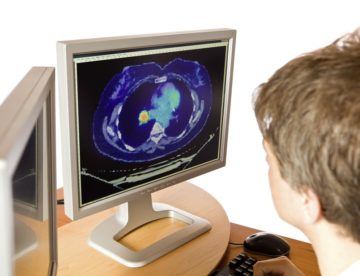Sponsored content from Nature:
 If a single medical objective could be applied to the entire range of cancers, it would be detecting the disease as soon as possible. “At the highest level, finding any cancer early gives you the opportunity for curative treatments,” says Andrea Ferris, CEO of research funding organization, LUNGevity.
If a single medical objective could be applied to the entire range of cancers, it would be detecting the disease as soon as possible. “At the highest level, finding any cancer early gives you the opportunity for curative treatments,” says Andrea Ferris, CEO of research funding organization, LUNGevity.
…It’s not easy to find tumors at early stages. “They’re small and, in most cases, they’re not causing any systemic effect,” explains Michael Morrissey, global head, early detection & data science, Lung Cancer Initiative at Johnson & Johnson. No symptoms mean the person doesn’t seek help for the growing tumor. “This makes screening programs crucial,” Morrissey says. It’s not just solid tumors that can evade detection. When asked what hematologic cancers are the most difficult to detect, Mark Wildgust — vice president, global medical affairs, oncology, Janssen Pharmaceutical Companies of Johnson & Johnson — says, “Almost all of them.” For the rare bone-marrow malignancy AL amyloidosis, diagnosis can require multiple visits to physicians, often over a few years. Symptoms are non-specific and suggestive of heart or kidney failure. “It’s a hard diagnosis,” Wildgust says, “and delays in diagnosis result in the outcome of those patients getting worse.” Without effective treatment, the expected survival time is only about a year1.
Similar challenges arise in lung cancer: about 75% of patients are diagnosed at advanced stages (stage 3 or 4)2. “These cancers usually start deep in the lung tissue, giving enough time for a lesion to grow into a cancer that is difficult to treat,” Morrissey says.In general, the longer that a cancer develops, the more mutations it acquires, enabling it to evade treatment. “The tumor gets more heterogeneous,” says Wildgust. Plus, the evolving cancer can co-opt the patient’s immune system to help or hide the cancer instead of fighting it. Cancer screening is crucial to early detection, but even that healthcare tactic faces challenges. “You need to balance the effectiveness of screening with risk of false positives and false negatives,” says Wildgust. “The specificity is so important, and that’s a balancing act that we need to work towards.”
More here.
